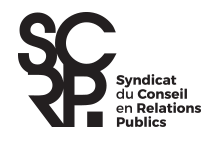How to choose your agency?

Choosing the right PR consulting agency requires an objective and structured approach, according to clearly stated and fair rules.
Contact a PR consulting agency
A well prepared consultation will ensure advertisers receive submissions in accordance with their quality specifications, that are comparable in terms of deadlines and budget. In other words, carefully preparing your brief is vital to be able to make the right choice and to establish a firm foundation for good working relations.
The advertiser should take the time to draw up a shortlist of firms that match their requirements. We recommend making an initial selection based on the submissions by the PR consulting agencies, their expertise and their references in the particular area.
1 – Initial selection: determine the target profile of the PR consulting agency, and limit the number of agencies to contact
When an advertiser considers contacting a PR consulting agency, they must first decide on the scope of the services they expect from it. PR consulting agencies come in a variety of sizes and specialisations. Some have comprehensive capabilities ( assessment, implementation, campaign evaluation, results evaluation) and work in all PR disciplines. Other are specialised in a particular area (public affairs, financial communication, etc.) or sector (new technologies, health, tourism, luxury goods, etc.). Some are affiliated with large international groups or networks and therefore can deliver your brief on an international scale.
Membership of Syntec RP is your guarantee that the agency complies with a professional code of ethics and is experienced.
Determine the profile of the PR consulting agency according to:
- the nature of the problem,
- the scope of the project (national or international),
- the duration of the mission,
- the budget.
2 – Selecting PR consulting agencies
The advertiser then schedules meetings with the PR consulting agencies on the shortlist at the agency offices. The key questions to answer during this phase are:
- What are the agency’s references in this field?
- What is its methodology?
- What are the agency’s budget management methods, control procedures, and methods of communication with the client?
- What tools does it use and how does it measure results?
If no agency stands out as meeting the requirements after this phase, a more in-depth consultation process is needed.
In this case, it is a good idea to select a small numbers of agencies and dedicate enough time to follow up on the consultation.
3 – In-depth consultation
An in-depth consultation should be conducted in accordance with the principles below, unless in exceptional circumstances:
Drafting specifications (written brief)
Prepare a clear and concise brief for presentation to all the PR consulting agencies on your shortlist to ensure you can compare their submissions. The brief explains the advertiser’s strategy and the goals they want to achieve. It gives information about the company, its market and products, and states the amount of the budget, or at least an intended budget range. Based on this information, the PR consulting agencies will make the most appropriate recommendations to achieve the objective while remaining within the budget.
It is essential to specify the level of detail required – concept note or detailed proposal – and only this specification must be taken into account when assessing the proposals submitted.
There are two forms of in-depth proposal.
1) Concept note
This gives the approach to the problem proposed by the PR consulting agency. The agency explains in a short note the method it will implement to solve the problem and the key points of its proposed strategy. The aim is to make a final choice.
2) The in-depth proposal
If the advertiser wants a more detailed recommendation before they make their final choice, an in-depth analysis of the problem is required, and therefore:
– Sufficient time
– The communication of a very comprehensive brief
– Meetings with the client’s team.
Oral presentation of the brief
We recommend sending a written specification to the PR consulting agencies a few days before the oral brief. This allows the firms to prepare a list of questions, to check that they have a clear understanding of the position, and to validate their initial choice of strategy.
The oral brief is the opportunity to comment on the specifications, provide a clearer understanding of the request and for the agencies to fine-tune their proposal if necessary.
To maximise its effectiveness, the oral brief should be made individually to each PR consulting agency bidding for the project.
Every bidder should be given the same length of time for the oral briefing.
The brief should be presented to the agency team that will be working on the advertiser’s project.
Information about the number and quality of the PR consulting agencies involved in the tender can be useful.
Time frame for the presentation of the recommendations of the PR consulting agencies
Deadlines must be the same for all the PR consulting agencies and be specified in advance.
It is important to allow a reasonable amount of time to enable the PR consulting agencies to gather their creative team and ensure the project is managed within budget. Recommendation: one to two weeks for a concept note and three to four weeks for an in-depth proposal.
Oral presentation of the the PR consulting agencies’ recommendations
This presentation should be made to the same panel and the same decision-makers to ensure a level playing field. Each PR agency must be given the same opportunity to pitch its proposal, explain its ideas and answer questions.
The pitch should be made by the team assigned to work on the project.
Compensation of PR agencies for in-depth proposals
We recommend compensating the PR consulting agencies on the shortlist that do not make the final selection. The amount should be decided before the competitive tender process and must be identical for all unsuccessful bidders.
Informing the PR consulting agency
As soon as the final selection of PR consulting agency is made, it is important to promptly inform the other bidders and explain the reasons for this choice.
Confidentiality
The PR agencies consulted agree to keep the information provided by the advertiser confidential.
All documents provided by PR consulting agencies during the tender process must be returned to them. Likewise, all documents provided by the advertiser must be returned by the bidders.
The documents, proposals and creative work presented during the tender process remain the property of the unsuccessful PR consulting agencies, unless otherwise agreed to the contrary under the terms of a particular contract. In general:
- The advertiser shall not organise a false competition with the sole aim of gathering campaign proposals free of charge (assessment and draft action plans).
- Unsuccessful PR consulting agencies may not present the same proposed campaign to a competing advertiser.
Specific case: the advertiser already works with a PR consulting agency
When an advertiser is already working with a PR consulting agency but wants to find another, either for a campaign in another area or with a view to changing their PR agency, the PR consulting agency under contract must be clearly informed of this procedure. The PR consulting agencies shall not express an opinion on the campaigns conducted by other consulting agencies.
4 – Drafting a contract
It is in the interests of each party, PR consulting agency and the advertiser, to prepare and sign a clear contract for either a one-off campaign or a long-term collaboration
This contract – or letter of engagement – should clearly specify the terms of the collaboration between the advertiser and the PR consulting agency: it may be a one-off agreement for a specific campaign for a pre-determined period of time, a long-term or on-going collaboration. In addition to defining the nature of the collaboration, the contract should include clauses relating to the transfer of intellectal property rights on creative material, the rights and obligations of both parties, the terms and conditions of payment, and the conditions of termination of the contract.
The drafting of a mandate contract is required when the client gives the PR consulting agency the responsibility to buy advertising space. The PR consulting agency therefore acts as an intermediary, acting on behalf of its client. The French Law of 29 January 1993, known as the “Loi Sapin” requires that any purchase of advertising space or any services provided by a media agent or intermediary related to publishing or distributing printed advertising material must be made under a specific written agreement.
For further information:
The Guide de la relation agence/annonceur UDA/Syntec Conseil en Relations Publics (UDA/ Syntec Conseil en Relations Publics Guide)
This document has been prepared jointly by by Syntec Conseil en Relations Publics and the French advertisers’ association, the Union des Annonceurs. It provides recommendations about the process of consulting a PR firm and the information to be included in a contract between the advertiser and the agency. The Guide also recaps on the professional code of ethics for PR consulting agencies.
La Belle Compétition charter
La Belle Compétition charter is a unique initiative in the world, the result of the collaborative work of about 10 partner agencies. This charter is available to all agencies and all companies and advertisers throughout the world, provided they are committed to transparency, responsibility and fairness in the tender process.12 recommendations designed to make sure your public relations is a failure!
This quirky and cheeky guide provides 12 recommendations to guarantee unsuccessful PR. Based on actual experience!







